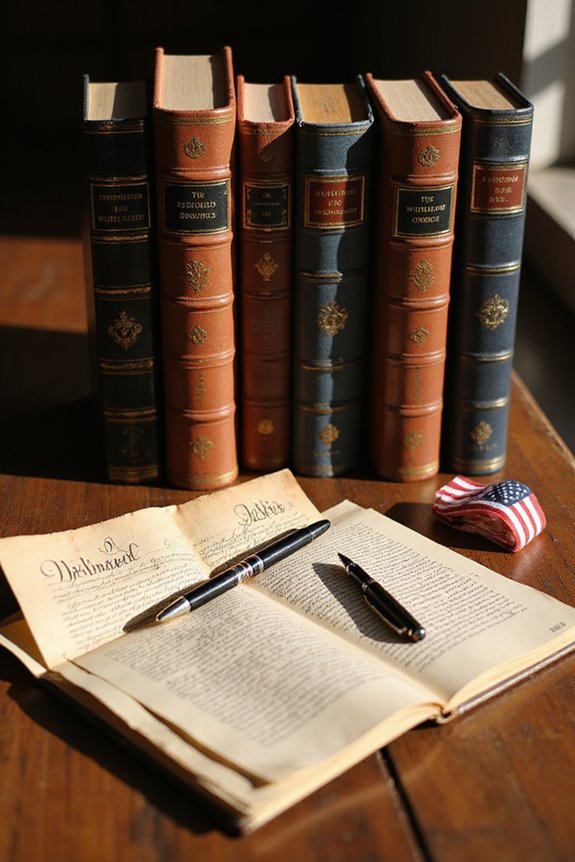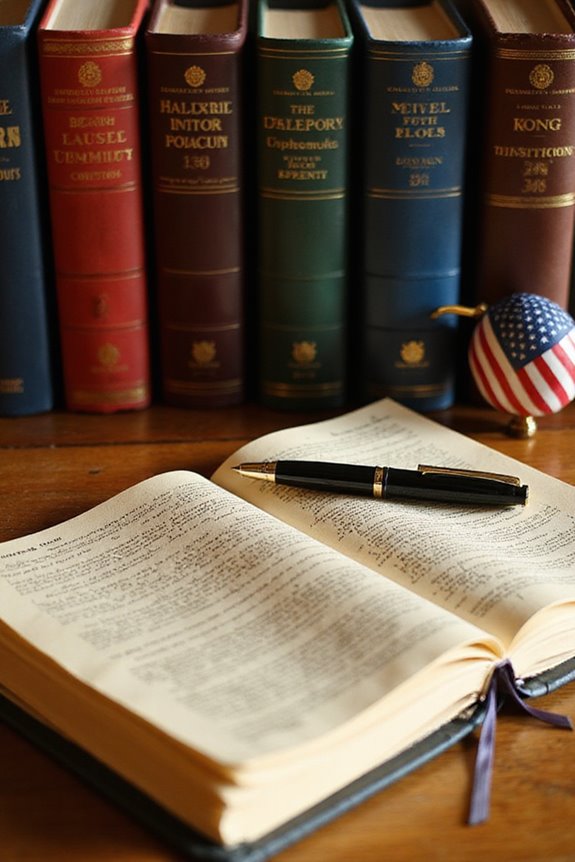When seeking the best political books for adults, we recommend exploring a range of influential texts and contemporary analyses:
- Classic Theories: Hobbes’ *Leviathan*, Locke’s *Second Treatise*, and Rousseau’s *The Social Contract* lay foundational ideas.
- Contemporary Insights: Works like *Autocracy, Inc.* by Anne Applebaum address modern governance challenges.
- Award-Winning Literature: Harari’s *21 Lessons for the 21st Century* discusses pressing global issues.
These selections provide critical insights into current political dynamics, enhancing our understanding of the field. Further exploration of these themes will deepen your political knowledge.
Key Takeaways
- *The Origins of Political Order* by Francis Fukuyama explores the evolution of political institutions and their relevance to contemporary governance.
- *Democracy in America* by Alexis de Tocqueville offers deep insights into American political culture and its democratic foundations.
- *Autocracy, Inc.* by Anne Applebaum examines contemporary dictatorships, providing critical perspectives on global political dynamics.
- *21 Lessons for the 21st Century* by Yuval Noah Harari addresses modern global challenges, advocating for interdisciplinary approaches to understanding politics.
- *Animal Farm* by George Orwell serves as a powerful allegory critiquing totalitarianism, making it a timeless read for political awareness.
Classic Political Theories and Influential Texts
Classic political theories and influential texts serve as the bedrock of our understanding of political thought and governance.
- Thomas Hobbes’ Leviathan introduces the social contract, arguing that human nature necessitates strong governance to prevent chaos.
- John Locke’s Second Treatise emphasizes consent, individual rights, and limited government, laying the groundwork for liberal democracy.
- Jean-Jacques Rousseau’s The Social Contract discusses the “general will,” advocating for collective sovereignty aimed at the common good.
- David Hume critiques social contract theory, suggesting governments form pragmatically through utility rather than formal agreements.
- Immanuel Kant highlights the importance of laws reflecting the general will, merging freedom with duty for a just state. His ideas resonate with John Locke’s emphasis on individual rights and the importance of government consent.
- Additionally, Machiavelli’s The Prince marks the birth of political realism, focusing on practical governance and power dynamics.
Contemporary Political Thinking and Movements

As political thought evolves, contemporary movements and ideas reflect the complexities of our current landscape.
- Populist Movements: We see a rise in populist and far-right movements globally, often fueled by discontent with traditional political systems.
- Anti-Establishment Politics: Figures like Trump and Javier Milei challenge mainstream parties, influencing political narratives and engaging disenchanted voters.
- Social Media Impact: Candidates utilize social media platforms, like TikTok, to connect with younger demographics and expand their political reach.
- Polarization Challenges: The political landscape is increasingly polarized, making it difficult for governments to effectively address voter grievances and maintain legitimacy. This polarization is evident as traditional parties struggle to regain voter trust amid growing dissatisfaction.
- Emerging Leaders: New political figures are gaining traction without traditional party backing, reshaping the way we view governance and representation.
Political History and Analysis

Political history and analysis provide us with essential insights into the evolution of governance, power dynamics, and societal structures across time. Understanding political evolution requires examining foundational texts that shape our historical context.
- *The Origins of Political Order* by Francis Fukuyama highlights institutional evolution from prehuman times to the French Revolution.
- Alexis de Tocqueville’s Democracy in America offers an in-depth exploration of American political culture and democratic institutions.
- Plato’s The Republic lays the groundwork for political philosophy focused on justice and governance.
Geography also plays a critical role. Tim Marshall’s *Prisoners of Geography* reveals how geographic realities influence state formation and international relations, illustrating the impact of geography on political power dynamics. These analyses collectively enhance our comprehension of historical political narratives and their implications for democracy today. Moreover, the concept of neo-colonialism examined in Kwame Nkrumah’s *Neo-Colonialism: The Last Stage of Imperialism* sheds light on the enduring impacts of historical power structures in contemporary politics.
Award-Winning and Critically Acclaimed Political Writing

Award-winning and critically acclaimed political writing encompasses a range of genres, each offering unique perspectives on governance and societal issues. Below are notable examples:
- Fiction:
- *Red, White & Royal Blue* explores political identity through romance.
- *Animal Farm* critiques totalitarianism, employing allegory for social commentary.
- Poetry:
- *Citizen: An American Lyric* addresses racism and identity in contemporary society, challenging societal norms.
- Danez Smith’s Homie reflects on the Black, queer experience, intertwining identity and social justice.
- Non-Fiction:
- *21 Lessons for the 21st Century* by Yuval Noah Harari tackles modern global challenges, emphasizing the need for interdisciplinary insights. Many of these works are particularly timely given the context of high-profile elections in 2024 globally. Additionally, understanding historical context is crucial for grasping the complexities of modern political issues.
These works not only entertain but also provoke thought, inspiring readers to reflect on their political identities and societal norms.
Fiction and Political Dystopias Impacting Awareness

Dystopian fiction profoundly influences our understanding of political structures and societal issues, often serving as both a mirror and a warning. These dystopian narratives raise awareness about oppressive governance and political injustices, helping us critically reflect on current power dynamics. Key points include:
- Exposure to totalitarian fiction can heighten our willingness to justify radical actions against perceived injustices.
- Dystopian stories help us contextualize real-world political debates, illustrating potential consequences of oppressive regimes. They often draw parallels with historical insights on governance challenges found in contemporary political discourse.
- Young adult dystopian novels encourage political engagement among youth, fostering political self-efficacy.
- Despite potential feelings of helplessness, these narratives can inspire empathy and resistance against oppressive systems. Additionally, fiction consumption trends show that dystopian narratives are increasingly popular, especially during times of crisis, further amplifying their influence on political attitudes.
Current Affairs and Policy-Focused Works
As we explore the landscape of current affairs and policy-focused works, it becomes clear that literature continues to play an indispensable role in shaping our understanding of contemporary issues.
Key titles highlight crucial themes:
- *At the Edge of Empire* by Edward Wong examines China’s political dynamics, revealing significant policy implications.
- *Autocracy, Inc.* by Anne Applebaum explores contemporary dictatorships, addressing governance challenges and their global ambitions.
- Robert Kaplan’s Waste Land discusses interconnected crises, demanding multifaceted policy responses to address the complexity of the “polycrisis.”
- Mónica Guzmán’s I Never Thought of It That Way promotes dialogue to bridge political divides, essential for healthy governance. Additionally, these works often reflect on themes of resilience and identity that resonate with readers seeking to understand the human experience behind political narratives.
These works equip us with insights into current political landscapes, emphasizing the need for informed engagement in shaping future policies. Furthermore, the recent Orwell Prize for Political Writing has recognized outstanding nonfiction that illuminates pressing political issues, highlighting the importance of literature in understanding our world.
Frequently Asked Questions
What Are the Essential Political Books for Beginners?
Imagine starting a journey through political ideologies and historical context. For beginners, we recommend titles like “An Introduction to Political Philosophy” and “The Origins of Totalitarianism” to illuminate foundational concepts and spark curiosity.
How Can I Find Political Books by Diverse Authors?
To find political books by diverse authors, we can explore online platforms, check library catalogs, and engage with reading groups. It’s essential to seek out diverse perspectives and guarantee author representation in our selections.
Are There Political Books Specifically for Young Adults?
Absolutely, there are many young adult politics books with engaging narratives! They explore themes like social justice and civic engagement, making complex issues relatable and inspiring for young readers. Let’s plunge into some recommendations together!
What Are the Best Political Audiobooks Available?
When exploring political audiobooks, we love diving into engaging political narratives. Our audiobook recommendations include classics and contemporary titles that spark thought and discussion, making complex issues accessible and enjoyable for everyone.
How Do I Choose a Political Book for a Book Club?
When we plunge into book selection, don’t we crave engaging discussion themes? Let’s consider books that spark curiosity, challenge perspectives, and resonate with current events, ensuring everyone’s voice is heard in our literary journey.






